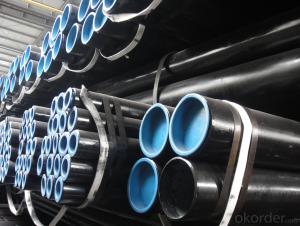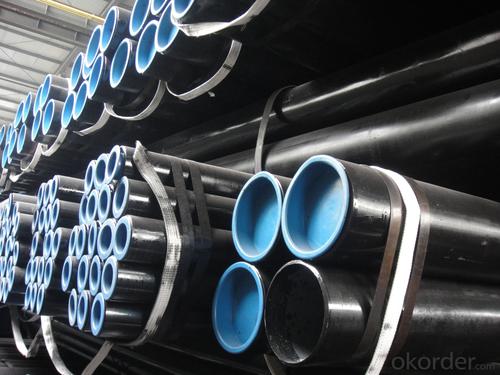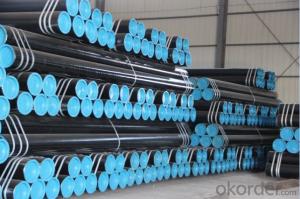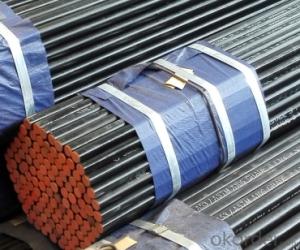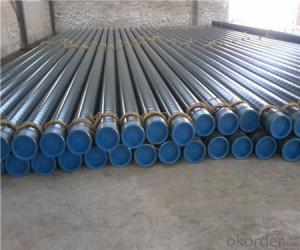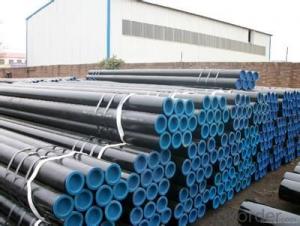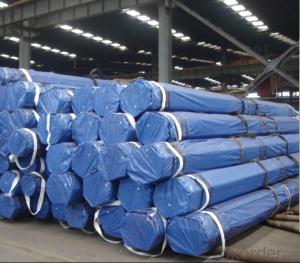BON STEEL SEAMLESS PIPE OD > 114.3 API5L/A53/A106 GR.B
- Loading Port:
- Tianjin
- Payment Terms:
- TT OR LC
- Min Order Qty:
- 20 m.t
- Supply Capability:
- 10000 m.t/month
OKorder Service Pledge
OKorder Financial Service
You Might Also Like
Specifications
1. OD 21MM-1066MM, WT 2MM-60MM
2. certificate: ISO, API
3. Strength: large diameter thick wall seamless pipe
4. BE, PE.
Carbon Steel Seamless Pipes | |
OD | 21.3mm-1066.8mm(1/2”-42”) |
WT | 2mm-60mm |
Length | Random Length: 3.5m-12m, or fixed length 5.8m or as the customer’s requirement. |
Standard | ASTM A53, ASTM A106, API 5L, DIN 17175, GOST8731/8732, G3457/G3452 etc. |
Material | Q235B, 10#,20#,45#, 16Mn, 15MnV. A53B, A106B, API5L B, A192, A179C, A213-T12, A213-T22, A335-P1, A335-P2, A333 ST37, ST33, ST37-2, ST35.8 ST42 etc. |
Certificate | API certificate and ISO certificate. |
Surface | Rust remove, black painting, antirust oil, varnish, 3PE, hot-dip galvanized etc. |
Package | By bundles, plastic caps or steel caps, woven, wooden cases or as requirement. |
Capability | 6000tons/month. |
End | BE/PE. |
Advantage | Big diameter and thick wall pipes. Best price with good quality. The partner you can trust. Good service and very patient. |
Seamless steel pipe | ||||
Alloy pipe | Cr5Mo(P5, STFA25, T5) 15CrMo(P11, P12, STFA22) 13CrMo44 12Cr1MoV P22 (10CrMo 910) T91, P91, P9, T9 Wb36 | GB5310-95 GB9948-88 ASTM335/A335M ASTM213/213M DIN17175-79 JISG3467-88 JISG3458-88 | 16-824*2-100 | The seamless steel pipe features resistance to high pressure, high/low temperature and corrosion and is used in the industries of petroleum, chemical engineering and electric power as well as boiler |
High-pressure boiler pipe | 20G, A106, ST45.8/ | GB5310-95 ASTMA106-99 DIN17175-79 | 14-630*2-80 | Temperature-resistant seamless steel pipe for high-pressure boiler |
High-pressure seamless pipe for petroleum cracking and fertilizer making equipments | 20, 12CrMo, 15CrMo | GB9948-88 | 10-530*1.5-36 | Boiler price for refinery, heat-exchanging pipe, seamless steel pipe for pipeline |
20, 16Mn, Q345 | GB6479-2000 | 18-530*3-40 | Fertilizer making equipment and pipe line | |
Low and medium pressure boiler pipes | 10, 20 | GB3087-1999 | 10-530*2-40 | Over-heat pipe for low and medium-pressure boiler, boiling water pipe, locomotive smoke pipe(big and small) |
Fluid pipe | 20, Q345 | GB/T8163-1999 | 8-630*1.0-40 | |
Structural pipe | 10,20,35,45, 16Mn, Q345B | GB/T8162-1999 | 6-1020*1.5-100 | |
Line pipe | Grade B | API | 60-630*1.5-40 | Carrying gas, water or oil in the industries of petroleum and natural gas |
Hydraulic prop pipe | 27SiMn | GB/T17396-1998 | 70-377*9-40 | |
Ship pipe | 410 | GB/T5312-1999 | 14-426*1.5-45 | Pipes for ship, boiler and over-heater |
- Q: How are steel pipes protected against mechanical impact?
- Steel pipes are protected against mechanical impact through the use of various methods such as applying protective coatings, using impact-resistant materials, utilizing proper installation techniques, and implementing impact protection measures like bollards or guards.
- Q: How do you transport steel pipes safely?
- Transporting steel pipes safely requires proper planning, equipment, and adherence to safety measures. Here are some guidelines to ensure the safe transportation of steel pipes: 1. Choose appropriate transportation equipment: Use a flatbed trailer or a truck with a flatbed to transport steel pipes. Ensure that the trailer or truck has a strong and secure tie-down system to prevent the pipes from shifting during transit. 2. Secure the pipes: Use nylon or steel straps to secure the steel pipes to the trailer or truck bed. Make sure the straps are tightened properly, evenly distributing the weight of the pipes and preventing any movement or shifting. 3. Protect the pipes: Use pipe chocks or padding materials such as foam or rubber to prevent the pipes from rolling or rubbing against each other during transportation. This helps to minimize potential damage and maintain the integrity of the pipes. 4. Observe weight limits: Ensure that the weight of the steel pipes being transported does not exceed the load capacity of the transportation equipment. Overloading can lead to instability and compromise safety. 5. Follow road safety regulations: Adhere to all local traffic laws and regulations, including speed limits and securing all necessary permits or licenses for oversized loads if required. Additionally, use hazard warning signs or flags when transporting long or oversized steel pipes to alert other road users. 6. Conduct regular inspections: Before starting the journey, inspect the straps, tie-downs, and other securing mechanisms to ensure they are in good condition. Regularly check the load during transit to ensure it remains secure. 7. Plan the route: Choose a route that is suitable for the size and weight of the steel pipes being transported. Avoid roads with low bridges, narrow lanes, or weight restrictions that may pose a risk to the safe transportation of the pipes. 8. Consider weather conditions: Take into account weather conditions, such as strong winds or heavy rain, which can affect the stability of the load. Adjust the transport plan accordingly or delay the journey if necessary. 9. Train and educate drivers: Ensure that the drivers responsible for transporting steel pipes are well-trained and aware of the proper procedures for securing and transporting the load safely. Regularly update them on safety protocols and any changes in regulations. By following these guidelines, you can transport steel pipes safely, minimizing the risk of accidents, damage to the pipes, and ensuring the safety of everyone involved in the transportation process.
- Q: How are steel pipes resistant to corrosion?
- The corrosion resistance of steel pipes is a result of several factors. Firstly, a protective layer, such as zinc or epoxy, is often applied to steel pipes. This layer acts as a barrier, preventing moisture and corrosive substances from reaching the steel and reducing the likelihood of corrosion. In addition, the composition of steel itself contributes to its resistance to corrosion. Steel is primarily composed of iron, with small amounts of other elements added to enhance its strength and durability. These additional elements, like chromium and nickel, create a natural oxide layer on the surface of the steel. This oxide layer acts as a protective shield, preventing moisture and oxygen from reaching the steel and causing corrosion. Furthermore, steel pipes can undergo a process called galvanization, where a layer of zinc is applied to the surface. This zinc coating provides an extra layer of protection against corrosion, as zinc is highly resistant to rust and oxidation. The zinc layer corrodes sacrificially instead of the steel, thereby extending the lifespan of the pipe. Overall, the combination of protective coatings, the composition of steel, and galvanization processes all contribute to the corrosion resistance of steel pipes. As a result, they are highly durable and suitable for a variety of applications, including plumbing, construction, and the transportation of fluids and gases.
- Q: Are steel pipes suitable for underground drainage systems?
- Yes, steel pipes are suitable for underground drainage systems. They are commonly used in such systems due to their durability, strength, and resistance to corrosion. Steel pipes can effectively handle the pressure and flow of water and other fluids, making them a reliable choice for underground drainage.
- Q: What are the different sizes of threads available for steel pipes?
- The different sizes of threads available for steel pipes can range from 1/8 inch to 4 inches, with various standard sizes in between.
- Q: What are the different types of pipe fittings used with steel pipes?
- There are several types of pipe fittings commonly used with steel pipes, including elbows, tees, reducers, flanges, couplings, and unions.
- Q: Can steel pipes be used for compressed air systems?
- Yes, steel pipes can be used for compressed air systems. Steel pipes are commonly used for their strength and durability, making them suitable for handling the high pressures involved in compressed air systems. However, it is important to ensure that the steel pipes are specifically designed and rated for compressed air applications to ensure safety and prevent any potential leaks or failures.
- Q: How are steel pipes used in underground drainage systems?
- Steel pipes are commonly used in underground drainage systems due to their durability and strength. They are used to transport wastewater, stormwater, and other liquids away from buildings and infrastructure to a designated discharge point. The steel pipes provide a reliable and long-lasting solution, ensuring the efficient flow of water and preventing any potential leaks or damage to the surrounding environment.
- Q: Can steel pipes be used for underground chemical injection?
- Yes, steel pipes can be used for underground chemical injection. Steel pipes are commonly used in various industries for their durability, strength, and resistance to corrosion. When it comes to underground chemical injection, steel pipes offer many advantages. They can withstand high pressure and temperature, making them suitable for transporting and injecting chemicals into the ground. Additionally, steel pipes have excellent chemical resistance, ensuring that they will not react with the injected chemicals and compromise the integrity of the system. However, it is important to select the appropriate grade of steel pipe that is compatible with the specific types of chemicals being injected to ensure optimal performance and longevity. Regular maintenance and inspections should also be carried out to identify any potential corrosion or damage to the pipes, ensuring the safe and efficient operation of the chemical injection system.
- Q: How are steel pipes used in the construction of power transmission lines?
- Due to their exceptional strength, durability, and versatility, steel pipes are commonly utilized in the construction of power transmission lines. Throughout the project, these pipes serve various purposes that contribute to the overall efficiency and reliability of the power transmission system. One primary application of steel pipes in power transmission line construction involves the installation of transmission towers. These pipes function as structural components, providing support for the transmission lines and maintaining their alignment. The high strength of steel ensures that the towers can withstand the weight of the transmission lines, as well as external forces like wind and ice loads. Additionally, steel pipes offer excellent resistance against corrosion, which is vital for ensuring the longevity of the transmission tower structures. Apart from tower construction, steel pipes are also utilized in underground transmission lines. These pipes act as conduits for the cables, safeguarding them from external elements and potential damage. Steel pipes are particularly advantageous in this application due to their ability to resist soil movement, withstand high pressure, and provide a secure pathway for the power cables. Moreover, the durability of steel ensures the integrity and longevity of the underground transmission lines, reducing maintenance needs and enhancing the overall reliability of the power transmission system. Furthermore, steel pipes are employed in the construction of foundations and anchors for transmission towers. These pipes are driven deep into the ground to offer stability and support to the towers. The inherent strength and rigidity of steel pipes make them ideal for this purpose, as they can withstand heavy loads and ensure the stability of the transmission towers even in adverse weather conditions. In conclusion, steel pipes play a critical role in power transmission line construction by providing structural support, protecting cables, and ensuring the overall reliability and efficiency of the transmission system. The exceptional strength, durability, and resistance to corrosion make steel pipes the ideal choice for power transmission line construction projects.
Send your message to us
BON STEEL SEAMLESS PIPE OD > 114.3 API5L/A53/A106 GR.B
- Loading Port:
- Tianjin
- Payment Terms:
- TT OR LC
- Min Order Qty:
- 20 m.t
- Supply Capability:
- 10000 m.t/month
OKorder Service Pledge
OKorder Financial Service
Similar products
Hot products
Hot Searches
Related keywords
